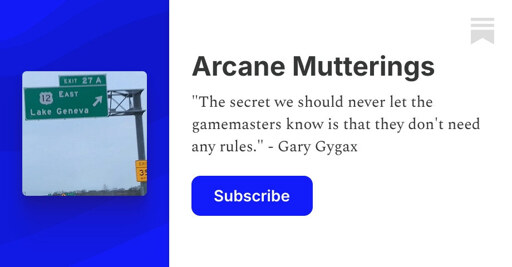Are you saying I can memorize the Dungeon Master’s Guide?
No, DM. I’m saying, when you’re ready, you won’t have to.
I’m definitely one of the ones alienated by the OGL shit. However, since I haven’t had a group since and my hyperfocus on TTRPGs/DnD ended, I don’t actually have any idea what people moved to, and this article talks abstractly but doesn’t mention any examples.
What are some actual systems that encourage ease of DMing, that this article would call “fifth generation TTRPG”?
Not sure about fifth gen, but I moved to Savage Worlds after the OGL debacle and after I ran my first session with 7 players.
Part of the reason I moved was because SWADE is generic and made for homebrew, since that means I can run nearly anything I can imagine. The other part is that DMing it is way, way easier. It is about as crunchy as DND, while demanding less homework and allowing more fiat for the DM (as is with lighter rules ttrpgs).
One example, an encounter with 10+ combatants at early levels could easily take up to two hours at the very least on DnD. In savage worlds, you make those mooks extras and focus on keeping the boss interesting. Mooks hit as hard anyone else, but they’ll drop from the first solid hit. This makes scenes like Boromir’s last stand very achievable. That, plus the simplified action economy (similar to PF but simpler), power points instead of vancian magic, classless character system, means that people aren’t looking and fidgeting around while a player rereads their sheet for the fifth time looking for a specific feature or description of a spell. Combat is over in minutes and since it just takes a couple of aced dice for it all to go wrong, it’s exciting.
It does have some stuff I’d remove if I could (removing attack rolls would be the first thing I’d do, replacing it with a straight damage roll with riders to inflict shaken and/or wounds), but it is far and away the TTRPG I want to DM.
Edit: lots of edits, I’m sleepy and missed some stuff.
You should check out Blades in dark and similar (Scum & Villany, Bands of blades). While it’s not the same definition of 5th gen as the author (VTT integration isn’t the point) it’s modern RPG design, with a lot of thing to ease the GM life. And IMO the right balance between rule light and crunchy (it’s definitely too crunchy/complex to be called rule light, but run quick and smooth) main features would be.
Everything has hit point aka clock, no matter whether we talk about opening a door, seducing a Noble or killing the dragon, the GM gives a target number and it’s up to player to stack enough succesr to do-it. Of course fail roll would have narrative consequences
A downtime phase which is more than spend XP and heal, with a whole mechanic to manage faction to faction game.
A stress meta currency, which helps you a lot, until you don’t have it anymore and start to struggle
Flashback and define equipment on the fly are things letting player jumping to action quickly without a long planning phase
IMO we’re full into modern RPG design and used existing concepts to build a fast paced great game easy to play and GM while still having a lot of rules/options
It probably means something like mothership as well, where the character sheet is designed such that it guides you on how to fill it without the need for a separate book.
But really I’m not sure I agree much with the article. I could be wrong but it seems to me that the audience is growing and therefore what the audience want is becoming more diverse.
My own very biased experience is I that I started playing dungeons and dragons, literally having no clue about this gigantic iceberg of other stuff with a 50+ year history behind it. Did that for a few years, through the pandemic etc.
Fast forward a bit, the idea of playing Combat rpgs now (so pathfinder, 5.5, whatever) interests me almost not at all. I want to tell stories and try out new personalities. I’ve now played a ton of Call of Cthulhu (which I’d argue is extremely rules light if you want it to be), Delta Green, Mork Borg, Vaesen and would have played dozens more if I had a more local group to play with.
Would love to play some Blades though… Weirdly a bit like Delta Green, you’d think it would be great for easier to organise one shots but actually you need a short campaign to get the most of it, I would say
I might be on the minority on all that, I don’t know!
But really I’m not sure I agree much with the article. I could be wrong but it seems to me that the audience is growing
I would tend to agree with you, feel like the article ignore 50 years of RPG evolution and still focus on D&D which despite a large market share, is a tiny drop of what the market has to offer and a very specific playstyle which again isn’t really a good example of what RPG look like, at the point many player do not play DnD as intended and end up tweaking it to do political/horror/investigations game
@Azzu @copacetic I think Cairn and other Into the Odd offshoots (Into the Odd, Electric Bastionland, Mythic Bastionland) would fit.
(But Mearls’ take on it almost reads more as an adventure design than game design… Like I could write a 5e or even 4e D&D dungeon with the bullet points, and then just include stat blocks in an appendix to pull up when necessary…)
Is it just me, or does this seem kinda narrowly focused on D&D-like games? Would be interesting to know how this history interacted with story games more broadly.





